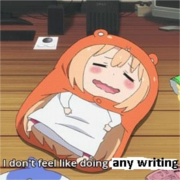|
I did not see this posted on the forums: www.sfu.ca posted:Study predicts imminent irreversible planetary collapse In a nutshell, the study proposes that a global environmental state-shift in our lifetime is likely. Link to article: http://www.sfu.ca/pamr/media-releases/2012/study-predicts-imminent-irreversible-planetary-collapse.html or http://www.kurzweilai.net/study-predicts-imminent-irreversible-planetary-collapse Original study: http://www.stanford.edu/group/hadlylab/pdfs/Barnoskyetal2012.pdf
|
|
|
|

|
| # ? May 30, 2024 22:13 |
|
Ahahaha we're so completely hosed arghhh
|
|
|
|
Welp. Hope I'll be dead by the time the poo poo hits the fan.quote:Society globally has to collectively decide that we need to drastically lower our population very quickly. More of us need to move to optimal areas at higher density and let parts of the planet recover. Folks like us have to be forced to be materially poorer, at least in the short term. We also need to invest a lot more in creating technologies to produce and distribute food without eating up more land and wild species. It’s a very tall order. None of this will ever happen. We really are doomed, aren't we. the kawaiiest fucked around with this message at 11:31 on Jun 13, 2012 |
|
|
|
the kawaiiest posted:None of this will ever happen. We really are doomed, aren't we. Pretty much. But hey, look at it this way... ...Ok I couldn't think of any positive angle.
|
|
|
|
Has there been any research looking into the concentration of oxygen in the atmosphere? It seems to me that if carbon dioxide is building up due to the burning of fossil fuels then there would be a corresponding decrease in atmospheric oxygen gas as it is consumed to form carbon dioxide and water.
|
|
|
|
4liters posted:Has there been any research looking into the concentration of oxygen in the atmosphere? It seems to me that if carbon dioxide is building up due to the burning of fossil fuels then there would be a corresponding decrease in atmospheric oxygen gas as it is consumed to form carbon dioxide and water. I daresay there have been minor changes but they would not be noticeable. C02 is currently around 395 parts per million in the atmosphere or 0.0395%. Oxygen comprises around 21% of the atmosphere, or 210,000 parts per million (the majority of the air is near-inert nitrogen). CO2 is a trace gas, the important thing is the fact that it has considerably higher capacity to trap heat than the Nitrogen and Oxygen which comprise the vast majority of the atmosphere.
|
|
|
|
I'll just leave this here.quote:The Second Denial - Dave Pollard http://howtosavetheworld.ca/2011/07/30/the-second-denial/ I agree with the general thrust of the article even if I disagree with some of the details. What this kind of thinking demands is a radical reassessment of values and a total shift in worldview. The new worldview that emerges is one that Edward Goldsmith, in the book "The Way," calls an "ecological worldview." Other writers like David Abram, E.R. Sorensen, and Daniel Quinn have also explored this new worldview. The kind of thinking and feeling that is necessary to truly understand this worldview is so new and unfamiliar to me that I can only really get at the edges right now, but the broadest terms I can use to describe it are deeply subjective, holistic (by nature, it bleeds into all aspects of the human experience), and on the spiritual level, animistic/pantheistic. Of course, this means doing away with the old "rational-objective" worldview entirely. The notion of objectivity itself is what I'd call into question; we have the idea that we are fundamentally separate from the things around us, and that means we can observe them from on high and tease out some sort of universal, rational truth from our observations. A natural extension of this philosophy is the will to control and dominate those external objects, and that's where we run into insurmountable problems, especially when it comes to nature. The ironic thing is that the only reasons we have to justify thinking of ourselves as separate from nature are flimsy value judgements - that we are more intelligent than other species, that we are God's chosen species, etc. Of course, doing away with a rational-objective worldview has devastating consequences for science. However, I find it fascinating that the highest levels of science have been tiptoeing around such consequences for decades. Consider things like the interpretations of quantum mechanics, particularly the von Neumann interpretation, or the deterministic, purposeful randomness of complexity theory. At the physical extremes - cosmological and subatomic - our traditional, objective understanding of science breaks down entirely, and it seems that our inherent subjectivity has doomed us to never have the ability to ascertain the fundamental nature of the universe. The mysterious twist that I'm getting at is that maybe we have it all backwards in thinking that the universe has some fundamentally objective character that we can understand. I'm not saying that there aren't some universal rules we can observe - things like gravity and evolution - but perhaps the entirety of existence itself naturally has subjectivity, awareness, and even will of some sort. Consider that there are a number of physical constants that if adjusted even infinitesimally would completely preclude reality as we know it. Think about the sense of wonder in Carl Sagan's voice when he explains that we're all made of star stuff, or Einstein's statement about God not being a gambler. Richard Dawkins has even called pantheism "sexed up atheism." It's a great soundbite, but it totally misses the radical moral, emotional, psychological, and spiritual implications of pantheistic/animistic beliefs. A truly animistic grounding would have never lead us to our current techno-industrial enterprise. I realize that I am wandering far afield here, but to tie this back into the immediate discussion, I see this flawed objective thinking in a common lament of environmentalists, what I call the "I can't believe we're doing this to the world!" fallacy. The problem is that such a statement sees the world as something external to be acted upon. It isn't. We are as much a part of the world as the soil beneath our feet. The fact that we are the agents causing climate shift and ecological collapse makes it no less natural a process than if trees, aardvarks, or a meteor caused it. This isn't even unprecedented in the history of the Earth - the oxygen crisis was caused by cyanobacteria. Note here that I'm absolutely not saying that what's happening is a good thing, just that it is as natural as anything else. Even the term "environment" is problematic. We'd be better off replacing it with the word "home." It's funny to me that the way we test the intelligence of other species is through language - not just any language, but human language. Abstract thinking, all that jazz. What a silly approach! We're constantly having to move the goalposts, too, lest grey parrots or gorillas be declared as smart as us. If we were to ever encounter a species as intelligent as us on another planet, we'd probably fail to recognize it, because we'd be expecting rational-objective civilization builders. We are blinded by our civilized human nature, and we project our behavior onto all other life and make value judgements based on their performance. Do you think dolphins pass judgement on us because we are incapable of grasping the meaning and syntax of their chirps and squeals? We can't stave off collapse, but I hope that in the death throes of this society, some of us can begin to build a foundation for coming generations. Part of this, to me, is a new way of understanding our place in the world, and I'm happy to know that many others are already exploring new types of thinking. I highly recommend the Dark Mountain Project; the folks there are wrangling with the despair and grief of collapse as well as the challenge of a new worldview in a literary and artistic way that really drives at the psychodrama of what is going on. Your Sledgehammer fucked around with this message at 21:47 on Jun 13, 2012 |
|
|
|
The worst part is how mad and belligerent people get when I bring this up, if they even do respond at all. This thread really is the only place I can join in on this kind of discussion without being persecuted. It's difficult.
|
|
|
|
I know your pain. People just don't want to think about it, it's too disturbing, and I agree with what you said a few pages back - most folks have an intuitive understanding that we're toast in the short term. The only way they have of coping psychologically is denial and anger. I know that I haven't truly come to terms emotionally with the horrific implications, because it still feels distant to me, even if I know it isn't. My family is largely bewildered by what I have to say about this stuff. I tried talking about a much less devastating problem, the Euro crisis, with an acquaintance yesterday, and I was pretty much ignored. Take heart in the knowledge that you're not the only one with these thoughts. There are people here and elsewhere on the Internet and in the world at large who are beginning to come together to cope with the enormous loss as well as strive towards alternate modes of human existence. Your Sledgehammer fucked around with this message at 23:47 on Jun 13, 2012 |
|
|
|
Fatkraken posted:I daresay there have been minor changes but they would not be noticeable. C02 is currently around 395 parts per million in the atmosphere or 0.0395%. Oxygen comprises around 21% of the atmosphere, or 210,000 parts per million (the majority of the air is near-inert nitrogen). CO2 is a trace gas, the important thing is the fact that it has considerably higher capacity to trap heat than the Nitrogen and Oxygen which comprise the vast majority of the atmosphere. I realise it would be a small drop, but it would still be measurable right?
|
|
|
|
4liters posted:I realise it would be a small drop, but it would still be measurable right? I'm honestly not sure. I guess so.
|
|
|
|
I think the thing with primitivism is that it's impossible to plan for the collapse of civilisation "within this century". Certainly it would be utterly impossible to dismantle civilisation in a controlled manner within a century without either triggering enormous wars, mass famines and assorted very nasty things, all of which would bring a return to some form of civilisation to limit the damage. So it's very, very impractical. Assuming complete civilisational collapse is useless, because we cannot do anything about it if that is the case. Arguing that is only going to get you dismissed as a hysteric. Besides that, it's also not going to be materially possible to dismantle civilisation in any effective manner, due simply to the political calculus involved in it - civilisation beat out primitivism when it was much, much less developed than it is now, after all - I see no mechanism for allowing primitivism to survive in a modern context, even post-collapse you'd still find people forming civilisations and so on. So basically, it's a useless analysis. It may not be fundamentally incorrect - I am by no means an expert - but politically, dismantling civilisation simply is not an option because doing it in any reasonably quick manner *will* involve genocide, at best by way of forced sterilisation and totalitarian breeding regulations. If you want to prepare yourself for the collapse of civilisation, go ahead, but it's such an unproductive assumption to argue from that you can hardly blame people who dismiss it outright. It's hard enough getting people to come to terms with climate change and the necessity of changing our mode of living to ameliorate environmental damage without coming across as a complete doomsayer. Another point I'd like to add is that civilisation itself seems to be conflated with the currently dominant capitalist mode of production in a lot of primitivist ideology, and that is a rather iffy piece of business - early feudalism, for instance, was from an environmental point of view completely sustainable. I mean, it was horrible for everyone involved, but it was certainly an example of environmentally sustainable civilisation.
|
|
|
|
V. Illych L. posted:Another point I'd like to add is that civilisation itself seems to be conflated with the currently dominant capitalist mode of production in a lot of primitivist ideology, and that is a rather iffy piece of business - early feudalism, for instance, was from an environmental point of view completely sustainable. I mean, it was horrible for everyone involved, but it was certainly an example of environmentally sustainable civilisation. I don't think feudalism was sustainable at all. Sure, it could plod along for a few generations, but land usage was pretty piss-poor, and they were wracked with their own fair share of ecological crises. Granted, these were more localized, but it's still not a sustainable system. To go back even further, Theophrastus, who was writing in the 3rd century BC, documented the problems associated with deforestation and soil degradation around Athens. Here's one paper that talks about feudalism and the ecology: http://www.jasonwmoore.com/uploads/Moore__Crisis_of_Feudalism__An_Enviornmental_History__O_E__2002_.pdf Civilization just seems to be inherently unstable and prone to collapse. Jared Diamond has explored this in Collapse, and I don't think you we can just dismiss discussions surrounding civilization's collapse because it's uncomfortable, and it sounds slightly insane. Sometimes there's just not a whole lot we can do about our own situation. And all talk of preparing for collapse? It can't be done, in my opinion. We as a race are doomed to be victims of history. 
Dr. Gibletron fucked around with this message at 00:43 on Jun 14, 2012 |
|
|
|
I've always been and will continue to be pro nuclear, but even if a miracle happened and somehow nuclear technology stopped being the boogeyman, by itself it wouldn't solve anything. Paired with efficient public transport, less cars, smaller houses, and so on, I think maybe it would solve a lot of problems (certainly not all of them but a lot of them). But on its own I think it would make very little difference. Please feel free to correct me if I'm wrong, I'm an artist not a scientist.
|
|
|
|
A shift to nuclear generation could do alot, but introducing more efficient gas cars and better electric ones will be important, as well as implementing home-scale renewable generation.
|
|
|
|
Here are the problems, though: 1. The things you are suggesting will never happen. Fossil fuel interests are too entrenched at all levels of society. 2. Nuclear generation, electric cars, so on and so forth are rearranging deck chairs on the Titanic at this point. The permafrost is melting, we've reached the tipping point. Climate change has now entered into a self-sustaining positive feedback loop. It is literally too late; no "doomsaying" involved, just reality.
|
|
|
|
Basically, the primitivist society would be inferior. That is the end of it, and why primitivists should be marginalized into non-existence or repressed if they try to put their insanity into practice. Their dystopian idea of the future is a tremendous disaster that has to be avoided at all costs. The mere minority claim that it is inevitable is not a reason to support this society, just the same as the "humans will be all gone in like... a billion years" is no argument for humans to exterminate their own species now or cheer along instances where the number of humans is reduced. At the heart of primitivism is a void, there is nothing to its proposal. So the reason someone is a primitivist in the most complete sense (seeks/hopes for complete destruction of civilization), is one of a few reasons. First, the person itself is such a depressive wastrel that he cannot muster anything of himself to improve humanity, so he resigns himself to failure, then extends this concept into his ideas on humanity as a whole. Second, the person is a fool. Third, the person is a hypocrite. Mind you, maybe someone that might be (probably wrongfully) labeled as a primitivist has some interesting ideas, that might be productive to human civilization. There is obviously a need for some kind of alternative civilization in general, and maybe that could have elements of what has been proposed by the more radical environmentalists, though that remains to be seen. The ideas of people like Your Sledgehammer just beg for outrage. It is the same reaction as I get when I'm exposed to other disgusting ideas like extreme racism or fundamentalism. It is simply intolerable, and when the ideas of a group of people are so incredibly wrong, it cannot be approached from the point of complete detachment. Of course, this does keep derailing the thread. Since Your Sledgehammer himself has proposed the idea of a separate thread for this discussion, I think he should go and do it, and make the new thread about the different interpretations of primitivism/radical ecology. If only to get it out of this thread. Also, it is such a huge disconnect of quality in this thread between the reasonable/news posts and the primitivist posts. To see a very specific example of this, just ctrl+f "Homo Rapiens" on this page of the thread. If I wanted such a level of discourse, I could read up on the time cube or visit some other conspiracy nut website.
|
|
|
|
Your Sledgehammer posted:Here are the problems, though: You should go and make a new thread about this. About half of most of the recent pages have been devoted to this very specific subtopic and so a new thread would make sense in most every way.
|
|
|
|
|
Your Sledgehammer posted:Here are the problems, though:
|
|
|
|
Dusz posted:Basically, the primitivist society would be inferior. That is the end of it, and why primitivists should be marginalized into non-existence or repressed if they try to put their insanity into practice. Their dystopian idea of the future is a tremendous disaster that has to be avoided at all costs. The mere minority claim that it is inevitable is not a reason to support this society, just the same as the "humans will be all gone in like... a billion years" is no argument for humans to exterminate their own species now or cheer along instances where the number of humans is reduced. At the heart of primitivism is a void, there is nothing to its proposal. Nobody is saying we should exterminate our own species. Although I don't understand what's wrong with cheering say, falling birth rates? There are more ways to reduce the population than killing people which seems to regularly slip your mind. You don't even know what primitivism is and yet you're here preaching away. quote:So the reason someone is a primitivist in the most complete sense (seeks/hopes for complete destruction of civilization), is one of a few reasons. First, the person itself is such a depressive wastrel that he cannot muster anything of himself to improve humanity, so he resigns himself to failure, then extends this concept into his ideas on humanity as a whole. Second, the person is a fool. Third, the person is a hypocrite. Really? quote:Mind you, maybe someone that might be (probably wrongfully) labeled as a primitivist has some interesting ideas, that might be productive to human civilization. There is obviously a need for some kind of alternative civilization in general, and maybe that could have elements of what has been proposed by the more radical environmentalists, though that remains to be seen. Alternate civilization? Do you understand what climate change is? How would an alternate civilization in any way help us. If anything, it would make it worse. quote:The ideas of people like Your Sledgehammer just beg for outrage. It is the same reaction as I get when I'm exposed to other disgusting ideas like extreme racism or fundamentalism. It is simply intolerable, and when the ideas of a group of people are so incredibly wrong, it cannot be approached from the point of complete detachment. You do realize that for those of us who are able to read it without being whipped into a rage are kind of annoyed every time you come into the thread pouring a bunch of emotional bullshit out with no substance of any kind. quote:Of course, this does keep derailing the thread. Since Your Sledgehammer himself has proposed the idea of a separate thread for this discussion, I think he should go and do it, and make the new thread about the different interpretations of primitivism/radical ecology. If only to get it out of this thread. Just stop reading the thread. "Homo rapiens" is a quote from an environmentalist author, and one that has a reason behind it. You may not like the terminology (I think it's a little crude as well) but I think his entire point is to elicit that emotional reaction when you read the word. To drive home just how poorly we have "managed" our environment.
|
|
|
|
Dusz posted:You should go and make a new thread about this. About half of most of the recent pages have been devoted to this very specific subtopic and so a new thread would make sense in most every way. I'm pretty sure that thread got made if you wanna go post in it. As uncomfortable as Your Sledgehammer's posts seem to make you, hes raising a pretty important point about the insolubility of this problem. Sure, you can just indignantly dismiss him, but his point still stands. I think to call it a void is to miss the mark. Its pointing out the truth that as the clock keeps ticking, the only real solutions are going to become more radical and untenable. Our prognosis needs to be more realistic. This "You can only talk about stuff productive to civilization or you need to geeeeet OUT" is some real love it or leave it, head in the sand nonsense. We're approaching a point where this kind of bravado is just feeding empty optimism to the patients in the terminal illness ward. I don't think sugarcoating the situation with daydreams about technology saving the world is helpful, because it gives people a phoney illusion that nothing needs to happen or change, because things will sort themselves out.
|
|
|
|
Yeah looking at how the thing we are most dependent on (food production) is going to be affected by climate change I can't help but think that we are heading for some sort of radical change in society. Whether it will turn out to be a wholesale destruction of our current way of life as described by primitivists or just a reduction in complexity and specialisation, I don't think anyone is in a position to accurately predict. But capitalism increasingly seem like it is being held together with bits of string and with an impending food and energy crisis I can't see the status quo lasting beyond the end of the century.
|
|
|
|
I see a lot of people making vague timeframes for when the poo poo will exactly hit the fan; and often these projections conveniently fall on the tail end of lifespans for most people alive today (i.e. 'sometime later in the century'). It almost seems like people are trying to comfort themselves that at least they won't have to be around to deal with it. Not anyone in this thread in particular, just a facet of the discussion that I've noticed comes up frequently. As many studies I've seen that say 'by 2100' there are a multitude claiming within decades, or even a generation, which are obviously a much tighter timeframe. Granted, I am not knowledgeable of all the scholarship, just my observation of the kind of language that has entered the discourse. In an odd and terrible way the 'end of the century' projections are almost comforting to me compared to the 'within a generation' ones, as it 'puts off' the horrible fate that could await. But in my gut I feel like it will happen far sooner than that; i.e. the stuff I've read methane locked under the permafrost pluming forth into the atmosphere. Ugh. I feel like I check into this thread to hear from some people actually into the phases of acceptance (the mention of the phases of grief up there is an evocative one), and working within and speaking within that vernacular/framework. Even (or especially) bringing up this subject around 'socially conscious' sorts brings kind of shrugs or dismissals or avoidance and it's infuriating. It's like they don't even have the language to even ponder or discuss the actual issue at hand. (I think it's because they are stupid liberals.) poo poo will hit the fan, no doubt, but this is when something will change, for better or for worse. Probably for the worse, but maybe with a sprinkling of something better? In that way I suppose I'm hopeful, but hopefully in a way that avoids the wide-eyed poo poo that comes out of the mouths of the 'eco friendly'.
|
|
|
|
Since Dusz is the only one that seems to have a problem and the primitivist critique dovetails nicely with climate change, I'm going to continue the discussion in this thread. If a number of you would prefer otherwise or a mod would like me to take this up elsewhere, I'll be glad to take the discussion to the thread linked a few posts above and would invite all of you who are interested to join me. Anyways, on with the show.V. Illych L. posted:If you want to prepare yourself for the collapse of civilisation, go ahead, but it's such an unproductive assumption to argue from that you can hardly blame people who dismiss it outright. I see where you're coming from, Illych, but this is where you and I diverge. Correct me if I'm wrong, but I think that the assumption you're making here is that noncivilized lifestyles are inherently unproductive, and those kind of value judgements and assumptions are exactly the ones that I think all of us need to be questioning. I'm also not trying to prepare myself for the collapse of civilization, because I think that the idea that you could prepare yourself for something like that is nonsensical. The collapse is going to be uncoordinated, unpredictable, and messy, and may take place on any number of timescales as global tetrahedron mentions. What I am trying to do is gain a greater understanding and appreciation of noncivilized lifestyles, including a practical understanding, as well as trying to show others why it would be unwise to return to an unsustainable mode of social organization in a post-collapse world. Dusz, your tone is unnecessarily hostile as well as offensive, but there are a handful of things that I feel merit a response: quote:Basically, the primitivist society would be inferior. Do you think you could look a member of the Hadza tribe in the face and say this to them? Assumptions like that one need to be questioned every time, because just like now, they are frequently thrown around without any evidence whatsoever to back them up. Whether or not something is "inferior" is a value judgement, plain and simple, and I personally feel that the one you are making is unwarranted. A year ago, I would have agreed with you and probably would not have questioned my own view at all, but we've reached a juncture as a species where the unwillingness to ask such questions has proved disastrous. Those of you who favor Dusz's assumption, I would invite all of you to question that assumption and do a little poking around on the net or in a library about immediate return societies. I did so and was deeply surprised and humbled by the counterintuitive conclusions that I came to. quote:Their dystopian idea of the future is a tremendous disaster that has to be avoided at all costs. The dystopic future that you are afraid of is now, and unfortunately, we're all going to have to experience it. However, if you're referring to a post-collapse primitive world itself as a dystopia, then you're woefully missing the kind of wild idealism and optimism that is inherent to the primitivist critique. To illuminate this, a question to ponder - is there any difference between human happiness and the fulfillment of human instincts? When I say "human happiness," I mean the deep sense of contentment that most of us hopefully experience at some point or other in our lives, not the fleeting moment of good feelings I felt when I finally beat Super Mario Bros. 3. When it comes to things like food, shelter, sex, love, social interaction and acceptance, and the ability to explore and display your own unique personality, I think that an open-minded consideration shows that noncivilized societies provide all of the above in a way that is physically, mentally, and emotionally more healthy than civilization. quote:Third, the person is a hypocrite. There is no doubt I am being hypocritical here. However, I see the exploration of a noncivilized lifestyle as a potentially lifelong project, and it is one that I am currently working on. quote:There is obviously a need for some kind of alternative civilization in general "One more big bandaid will surely cure the patient." The analogy of an extremely ill patient that displays many different symptoms is actually pretty helpful to understanding the depth of the primitivist critique. Ecological destruction is just one of many issues that it addresses. As I alluded to earlier, anthropologists divide the societies they study into two categories - immediate return and delayed return. Delayed return societies store food, immediate return do not. It's a continuum, with some existing at either end, and some existing in between. What they find over and over again is that delayed return societies invariably produce centralization and hierarchy. A few of the many possible endgames of hierarchy and centralization are things like "too big to fail" banks and sovereign debt crises. I'd also encourage you to take a look at John B. Calhoun's studies about population density and its effect on behavior. He crammed rats into enclosures with high population densities and the results were things like males becoming hyperaggressive and going on killing sprees. Compare this to civilization and I think you'll see what I'm getting at. A few off-the-cuff responses to common objections: You're advocating genocide. Not at all. Claiming that the ship is sinking is not the same as sinking the ship yourself. My stance towards civilization is and always has been one of peaceful protest and nonviolence. The average lifespan of noncivilized people is much lower than civilized people. For one, this is only true of the more recent, highly developed civilizations. Secondly, this disparity in average lifespan can be largely attributed to a higher rate of infant mortality among the noncivilized. A quick game of "Would you rather?": Newborns dying every now and again or 5 billion people dying in an unimaginable apocalypse? Nature shows us that there will always be some mechanism that limits population. The noncivilized are deeply impoverished. They do not see themselves as such. They are only materially poor. Material wealth does not track well statistically with happiness.
|
|
|
|
Your Sledgehammer, Do you think you could recommend some books/authors who are pretty prominent amongst primitivists? I just went through a environmental history course at my university, but we didn't really deal with anyone you could label as a primitivist. I have a lot of sympathy with what I've seen you write in this thread, and I'd be interested in doing some more research into authors that offer more detailed critiques.
|
|
|
|
Dr. Gibletron posted:Your Sledgehammer, Derrick Jensen John Michael Greer Daniel Quinn I think Derek Jensen is probably going to be your best bet. John Michael Greer's blog is pretty good as well.
|
|
|
|
Dusz posted:You should go and make a new thread about this. About half of most of the recent pages have been devoted to this very specific subtopic and so a new thread would make sense in most every way. Your Sledgehammer's posts are entirely relevant to the subject of climate change, and I for one enjoy reading them. Also, you don't appear to be grasping the primitivist viewpoint as it appears in this thread. Your claims of it being like genocide are so misguided I almost didn't comment because you continue to ignore posts trying to set you straight on the subject.
|
|
|
a lovely poster posted:Derrick Jensen Just to clarify, there are very few prominent authors who actually identify as primitivist/anarcho-primitivist. None of the authors listed above do. It's a stupid umbrella term which wasn't invented by the people it covers. "Primitivist" is often considered a pejorative term; I know that Quinn openly mocks primitivists.
|
|
|
|
|
Well this thread has kinda confirmed the sneaking suspicion I had that poo poo could not go on forever. Its sort of like the economic crash(es) which occur as debt is piled up to jack up asset prices. However the environment can't be deleveraged or written off like debt can. The only question I have left is if hypothetically could a modified smallpox or something remove enough population to 'save' civilization? I am guessing not.
|
|
|
|
Desmond posted:Your Sledgehammer's posts are entirely relevant to the subject of climate change, and I for one enjoy reading them. Also, you don't appear to be grasping the primitivist viewpoint as it appears in this thread. Your claims of it being like genocide are so misguided I almost didn't comment because you continue to ignore posts trying to set you straight on the subject. Hell, I'm still waiting on Dusz to answer some of my questions about his reasoning.
|
|
|
|
Your Sledgehammer posted:Second denial Like you I get called a pessimist or 'doomsayer' whenever I speak my mind, but basically I can't see how we can possibly avert the major and catastrophic changes that are coming. We are beyond the point of no return, no amount of wishy washy personal 'going green' measures, carbon trading or farcical 'Earth Hour' awareness bullshit is going to make a bit of difference. The way I see it our society has had decades where the problem was apparent, however instead of taking action to mitigate this when it was still possible we sat on our hands and buried our heads in the sand. Now with the problem beginning to bear down on us the time for incremental steps and gradual change is over. Our only hope is to make immediate fundamental changes to the way we live on a global scale, this just is not going to happen. The only way we will change our ways on this scale is when we're forced to, call me a cynical bastard but I'm sorry that is just the reality of us as a species. I honestly find it disgusting that in 2012 people are still arguing over whether or not human driven climate change is happening at all. Personally I think this is largely due to denialist propaganda shovelled down the worlds throat by the fossil fuel industry and their political backers. Those guys are the real criminals in all this, and fittingly they are not going to be around to see the fruit of their greed. I think in the future our society right now is going to be viewed as criminal for what it has done. Execu-speak fucked around with this message at 06:21 on Jun 14, 2012 |
|
|
|
For anyone wanting to understand what primitivism is, here's a link, one which if you read through calls the genocide statement an attack with no grounding. http://www.rewild.info/anthropik/2005/10/5-common-objections-to-primitivism-and-why-theyre-wrong/ I think it's important to understand that if you really want to carry that conversation further.
|
|
|
|
What scares me most is how we have absolutely no idea of how this is going to play out. We've simply never had catastrophe on this large a scale before, this is one of those "fundamentally restructure the way humans live" kind of thing. The last time we had an event of this magnitude was probably the Black Death (nearly 700 years ago) and that decimated Europe. And 'all' that did was kill people - we're talking about entire countries suddenly becoming submerged or their farmland turned into deserts. What are these people going to do? Mass starvation, or completely unprecedented massive population shifts all across the world. These are our options.
|
|
|
|
I would kind of like to go back to feeling like our animal natures have not already doomed us. I can't reconcile that urge with the idea that it's better to know an uncomfortable truth than persist in the pleasant fantasy - but if we're hosed anyway, and I can't stop the acceleration, would it be so bad? The palliative approach seems reasonable but depressing as gently caress. GG humans.
|
|
|
|
http://en.wikipedia.org/wiki/Societal_collapse This is quite interesting for a laymans explanation of how poo poo might pan out.
|
|
|
|
Your Sledgehammer is still in denial. You are falling into the same traps as the other denialists if you think primitivism is an appropriate response. There is no appropriate response. Given past history, I don't doubt that some form of civilization will rise again and fall again. Humanity as a whole is a blind, non-evolving and incompatible part of any ecosystem it touches. There is no form of idealism to combat this. Primitivism has the same air of romanticism as some forms of anarchic government did decades ago, and with about the same realism. It may comfort you, that's fine. Don't confuse it with any kind of answer.
|
|
|
|
Your Sledgehammer posted:I see where you're coming from, Illych, but this is where you and I diverge. Correct me if I'm wrong, but I think that the assumption you're making here is that noncivilized lifestyles are inherently unproductive, and those kind of value judgements and assumptions are exactly the ones that I think all of us need to be questioning. quote:I'm also not trying to prepare myself for the collapse of civilization, because I think that the idea that you could prepare yourself for something like that is nonsensical. The collapse is going to be uncoordinated, unpredictable, and messy, and may take place on any number of timescales as global tetrahedron mentions. What I am trying to do is gain a greater understanding and appreciation of noncivilized lifestyles, including a practical understanding, as well as trying to show others why it would be unwise to return to an unsustainable mode of social organization in a post-collapse world. If so, you're arguing that propaganda and moral judgements are powerful enough to deter the historical movement of productive forces. This is a fundamentally idealist claim that I find it hard to sympathise with, because if it had been the case I imagine that the medieval clergy would have figured out how to do it. The initial move to agrarianism was not pleasant for those who undertook it; people didn't end up settling the land because it produced a higher quality of life for the individual. The main force behind the foundation of civilisation was the inherently higher productive efficiency of civilisation as compared to primitive society. This will be the case even after an eventual collapse. Understand: I totally agree that something fundamentally has to change. Our extreme focus on consumption is only going to lead to tears in the long run. It's just that primitivism is, in a sense, a deeply reactionary ideology, and beyond the obvious moral questions of its implementation I don't think that it's a materially tenable vision of society. Rather than looking back, we need to forge ahead (said the socialist, and everyone gasped in shock and surprise).
|
|
|
|
So, lets say civilization IS going to to collapse (and I think there's a reasonable chance it will, maybe within our lifetimes, maybe later). Now what? It's all very well telling people what to think, but a lot of us just want to be told what to DO. My personal approach is based on a very simple philosophy: "Resistance is the secret of joy". I've picked my own small battle. The forests are disappearing at an alarming rate, so I'm going to plant some more goddamned forests with my bare goddamned hands. I've found a charity, I volunteer for them and I'm going to try to gradually move towards doing something similar full time, if I can, or to spend more time volunteering if I can't afford to go full time. Will it make up for the losses occurring elsewhere? Absolutely not. Will it help stave off a collapse? very unlikely. Will the forest I'm helping to nurture even survive through the changes that are happening now and the chaos of a collapse? With a bit of luck they might, in some form, and they are all the more likely to do so for every additional tree I plant. But even if they don't, they're here NOW, they're growing NOW and living and striving, the ecology of this one small corner of the world is improving by increments for as long as it lasts. I think that's all we can do. Our lives are ephemeral, in 50 years it will be like I was never here at all. While I am, I'm going to do every goddamned thing I can to make a difference, however pointless, however useless, because to do otherwise is to curl up and die right now. Whatever form it takes, resistance is an end unto itself as much as a means to future solutions.
|
|
|
|
V. Illych L. posted:I'm not saying it's necessarily unproductive or even super-unpleasant (heavily disabled people would be hosed, though, as would any number of other groups)
|
|
|
|

|
| # ? May 30, 2024 22:13 |
|
While this is going to be a big deal, I get the impression that a lot of people are anticipating some sort of zombie apocalypse?
|
|
|
|

























